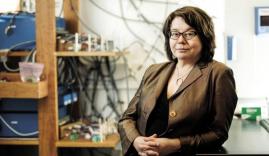
Linda Faye Nazar FRS FRSC OC is the Senior Canada Research Chair in Solid State Energy Materials and Distinguished University Research Professor of Chemistry at the University of Waterloo, Canada. She has been inducted into the Royal Society (London) in recognition of her work.
She is also a Fellow of the Royal Society of Chemistry (UK), an Officer of the Order of Canada, and a Justus Liebig Visiting Professor in Germany.
Professor Nazar’s research focuses on developing new materials that can store and deliver electrochemical energy, and on advancing next-generation rechargeable battery research and design. Her research program encompasses complex material synthesis; ex-situ and in-situ studies of battery materials involving X-ray/neutron diffraction; computation and X-ray/impedance/NMR spectroscopies, combined with fundamental electrochemistry used to examine the underlying processes in solids.
She has co-authored > 280 publications garnering more than 75,000 citations (H index 126; Google Scholar). She is on the Highly Cited Research List (WoS) each year from 2014 - 2022. She has been a member of the Directorate of the USA Department of Energy’s Joint Center for Energy Storage Research since 2013. Prof. Nazar currently sits on the Advisory Councils for the Andlinger Center for Energy and the Environment at Princeton University, and the Israel National Research Centre for Electrochemical Propulsion. She is the Director of the Waterloo Institute of Technology’s International Scientific Advisory Board.
Professor Nazar has received numerous awards, including the Materials Research Society Medal (2020, co-awarded with Yi Cui); the Bailar Medal (Univ Illinois UC, 2019); the IUPAC Distinguished Woman in Chemistry (2011); and the Moore Distinguished Scholar (California Institute of Technology) (2010). Other recognitions include national awards such as those from the Chemical Society of Canada (The CIC Medal: 2019 - its most prestigious award and the Steacie Award, 2022, the second most honored award) and international accolades including the Electrochemistry Society Battery Division Research award (2009), the International Battery Association award (2011), the August-Wilhelm-von-Hofman Lecture award (German Chemical Society, 2013), and the International Automotive Lithium Battery award (2017).
